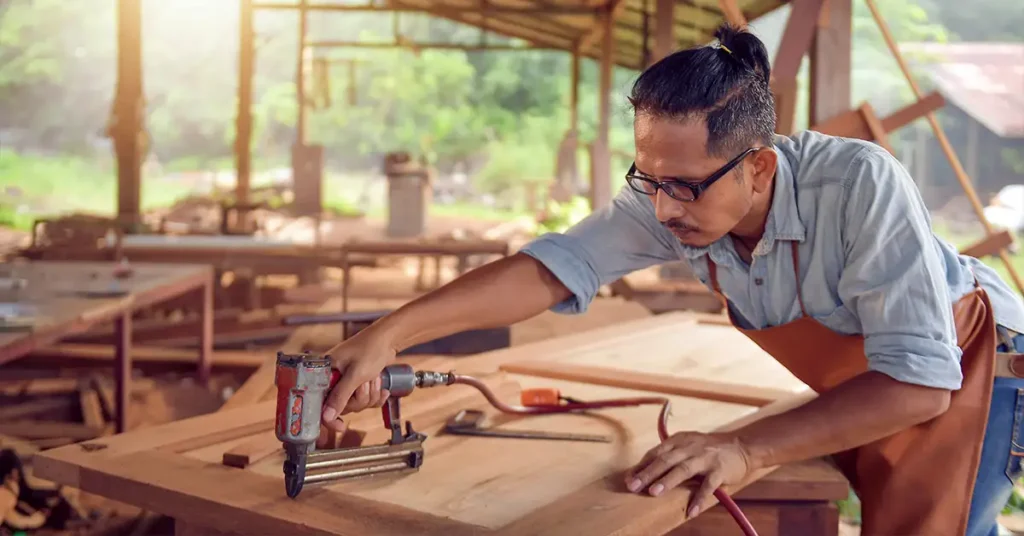Carpenter Insurance
Carpenters face daily risks from tools and job site accidents. Carpenter Insurance protects against injuries, equipment theft, and lawsuits. Key policies like general liability, workers’ compensation, and equipment coverage help safeguard your business and ensure financial stability, allowing you to focus on your craft without worry.
Choose the right coverage from trusted insurance providers.































Why do carpenters need insurance?

In my years working alongside carpenters, I’ve seen firsthand how essential insurance is in this risky line of trade. Handling sharp saws, powerful nail guns, and heavy tools day in and day out makes carpentry more dangerous than it may appear.
Whether it’s a minor accident or a serious mishap, injuries can halt a project instantly and put a small business at financial risk. I’ve known fellow workers who faced unexpected lawsuits just because of one on-site issue, and others who lost expensive equipment to theft.
That’s why I always recommend choosing an affordable policy designed to protect every carpenter. This kind of insurance isn’t just a safety net, it’s a smart move for anyone serious about their business in the carpentry world.
Recommended Coverage for Contractors and Construction Firms
These policies help cover the most common risks in carpentry, highlighting the essential types of business insurance that carpenters need.
Business owner’s policy
This policy conveniently bundles commercial property and general liability insurance into one cost-effective plan for dealers. A BOP is ideal for securing auto shop insurance and shielding businesses from financial losses.
Under this plan
Customer injuries
Damaged customer vehicles
Damaged business property
Commercial auto insurance
A policy designed for dealers and repair shops helps pay for property damage and medical bills after an accident. It is required in many states for businesses that own cars.
Under this plan
Car accident repair costs
Vandalism and theft
Weather damage
General liability insurance
This policy covers basic liabilities for auto service businesses, protecting against dealer risks like customer injury at a repair shop. To maximize savings, businesses can bundle it with property insurance or a business owner’s policy for broader coverage.
Under this plan
Customer injuries at a repair shop
Accidental vehicle damage
Slander and advertising injuries
Workers’ compensation insurance
Workers’ comp is required for auto shops in almost every state to cover employee injuries and related costs. It protects both employees and sole proprietors by handling work injury costs that health insurance might deny.
Under this plan
Employee medical expenses
Partial wage reimbursement
Lawsuits
Tools and Equipment Protection Plan
Contractor’s tools and equipment insurance helps protect your construction gear no matter where you go. This policy keeps your tools and equipment safe while you’re moving them (in transit) or using them at a jobsite. To qualify, your items usually need to be valued under $10,000.
Under this plan
Equipment less than five years old
Mobile equipment
Small toolsa
Professional Liability Protection Plan
Professional liability insurance for contractors, also known as errors and omissions insurance, protects against financial losses when a construction mistake or oversight causes a lawsuit. This policy is key for handling claims related to your work and promises made to clients.
Under this plan
Accusations of negligence
Failure to complete construction
Failure to use promised materials
How much does insurance cost for carpenters?

When calculating insurance costs for a carpenter, several factors come into play. A carpenter who works alone will generally pay less than one working in a carpentry shop with multiple employees.
The costs depend on the type of carpentry work being done whether it’s residential or commercial. Other elements such as business equipment, property, business size, location, and revenue also significantly affect the premium.
Additionally, the types of insurance purchased, like builder’s risk insurance, and policy limits or deductibles will determine how much a carpenter has to pay. If you hire subcontractors or have additional insureds, these also influence the overall carpenter insurance costs.
Key Factors Affecting Carpenter Insurance Costs:
- Type of carpentry work (residential or commercial)
- Business equipment and property
- Business size, location, and revenue
- Types of insurance purchased (e.g., builder’s risk insurance)
- Policy limits and deductibles
Hiring subcontractors and having additional insureds
How do I get a carpenter's insurance?
Getting a carpenter’s insurance is simple and can be done quickly if you have your business information ready. The insurance application will ask for key details such as your business, revenue, and the number of employees.
For small business owners, you can easily buy a policy online and receive a certificate of insurance through Eagle Nation in just three easy steps: complete a free online application, compare insurance quotes, and then choose policies.
Once you pay for your policy, you can download the certificate. Eagle Nation’s licensed insurance professionals work with top-rated U.S. insurance agencies to help you find the most affordable coverage that fits your carpentry shop, whether you work independently or hire employees.
Two ways to start your coverage

Quotes online

Talk to an agent
Verified business insurance reviews
Hear from customers like you who purchased small business insurance.
Common questions about Carpenter insurance
The need for a carpentry business to be licensed, bonded, and insured depends on the laws in your specific state. Different states have varying requirements based on the type of work.
Specialized Tasks and Large-Scale Projects
Certain carpentry work may require a license for specialized tasks, such as electrical work. Large-scale projects like building structures or converting rooms might require a permit.
Surety Bonds in Carpentry
In addition to licenses and permits, you might need surety bonds—bid bonds, performance bonds, and payment bonds, which ensure you fulfill project terms and contractual obligations.
Insurance Needs Based on Licenses, Permits, and Bonds
Your insurance needs are often determined by the licenses, permits, and bonds you hold. For example, general contractors usually need commercial general liability insurance to meet state licensure requirements.
Avoiding Rate Increases
While buying short-term or temporary policies, such as carpenter liability insurance by the hour or on a daily basis, might seem convenient, maintaining continuous coverage offers several key benefits. One major reason is avoiding rate increases—if you cancel your policy, your insurer may either refuse to sell you a new one or increase the premium for the same coverage.
Coverage Remains Active
Coverage remains active with continuous insurance, as certain claims-made policies, like professional liability insurance, only cover claims made while the policy is active. If your coverage is canceled and you’re sued for work completed earlier, you won’t be covered, even if you were insured during the work period.
Maintaining Your License
Additionally, keeping your insurance active ensures you maintain your license, as some professional licenses require insurance to remain valid. If you cancel your policy, you risk losing your license and may find it difficult to restore it.
Business-Related Losses and Coverage Gaps
Moreover, without commercial insurance, you're responsible for business-related losses that could occur, including work-related auto accidents, which are only covered by commercial auto policies or hired and non-owned auto (HNOA) insurance. Work-related medical expenses are usually not covered under a personal health policy, which is why workers' compensation insurance is crucial, and it’s often legally required.
Accidents and damages at your home involving business clients or property are typically only covered by general liability insurance, commercial property insurance, or both combined in a business owner's policy (BOP). Homeowners' policies usually do not cover business-related incidents.
Essential Insurance Policies for Carpenters
While general liability insurance and workers' compensation provide essential protection for workplace injuries and third-party claims, they don't cover all potential risks.
Commercial Property Insurance
Commercial property insurance covers your building and its contents, such as tools, computers, and furnishings, protecting against financial losses caused by fires, storms, or burglaries.
Business Personal Property (BPP) Coverage
If your carpentry business doesn't have a physical building, business personal property (BPP) coverage can be added to your general liability policy to protect business property at a designated location.
Inland Marine Insurance
For coverage while transporting tools or working at a jobsite, inland marine insurance is essential. This policy covers your business items in transit or at a worksite.
Commercial Umbrella Insurance
Commercial umbrella insurance offers additional coverage if your general liability, commercial auto, or employer’s liability policy reaches its claim limit.
Cyber Insurance
Finally, cyber insurance or cybersecurity insurance protects against the significant costs of a data breach or malicious software attack, covering expenses like customer notification, credit monitoring, legal fees, and fines.
Top construction contractors we insure
Don't see your profession? Don't worry.
We insure most businesses.

"Getting this insurance plan was a lifesaver for me. My saw tool was stolen, and the insurance quickly replaced it. Definitely recommend!"